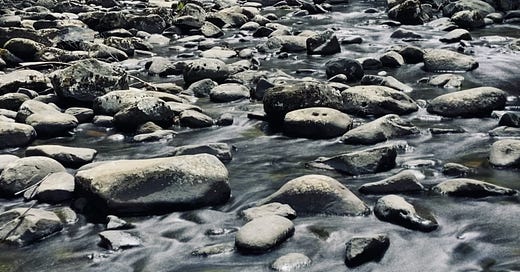It was clear to me from our first acquaintance that Colm and Dearbhla Doyle weren’t crazy hippies high on weed, whatever the local gossip might say. They were just people who followed their own path. It didn’t always take them where they expected to go, but they accepted that with humility and good humour.
The more I found out about what they were trying to do and why, the more I appreciated the ingenious design of their farmlet.
Dearbhla in particular was always up for a chat about the farm and the discoveries they were making along the way to self-sufficiency. Sitting at the kitchen table over a pot of tea, or wandering in the infant ‘food forest’ of skinny saplings while her daughter finished her chores, she’d give me candid assessments of what was working and what wasn’t — yet. She also lent me reading material so I could find out more about Permaculture and make up my own mind.
Áine’s Mam was a striking woman, olive-skinned, dark-haired and dark-eyed — though the hair was already streaked with grey in her early forties. It was thick, like her daughter’s, and she wore it loose. In fact, the whole family was blessed with luxurious hair. Fine, wispy hair ran in our family, so I found this fascinating and wonderful.
Her face often wore an intense expression, almost severe, especially when she was turning something over in her mind. You wouldn’t want to get on her wrong side, I think. Yet she was gentle and kind to me. I could see the sort of woman that Áine might become, after taking on twenty more years and twenty more kilos. I hesitate to use the cliché ‘Earth Mother’, but that was certainly how she came across to the skinny, adolescent boy that was me.
Áine thought it hilarious how smitten I was by her Mam — and would ask me sometimes just which of them I thought I was dating. It’s as well I hadn’t seen The Graduate at that point, or my dreams might have been even more … interesting. Colm bore my puppy-dog infatuation with amused tolerance — insofar as he noticed. He was the dreamer and visionary, she the practical doer and maker.
I carried these half-understood ideas of a ‘different way of doing agriculture’ home with me to chew over and digest with my own family.
They gave Dad dyspepsia. He pointed out that viniculture was a commercial enterprise — one that required straight lines, monocultures, machinery and, yes, chemical pesticides and fungicides. His father and grandfather had ruined their backs and their bank balances growing grapes the old way — and then had taken up the new technology with enthusiasm, once it became affordable. It was a great boon to the wine-grower. He shook his head over Rachel Carson’s Silent Spring, when I tried to read him a passage. ‘Sentimentalism! Alarmist nonsense! Pah!’
Mum played the conciliator and intermediary. Her productive kitchen garden was more orderly than the Doyles’ whimsical herb spirals, meandering paths and keyhole gardens, but it too was spray-free and organic. This was the way all kitchen gardens were, back home. She was willing to take on new perspectives, too. She asked about their use of mulch, appreciated the benefits of a biodiverse garden.
She could see the advantages of letting poultry free-range in the veggie garden — as well as the disadvantages that the Doyles were discovering the hard way. These included staggering losses to foxes, snakes and hawks, and the ability of a small flock of chooks to turn a well-tended veggie bed into a diorama of the Somme or the Western Desert, depending on weather, within the space of a few hours.
As soon as an excuse came up, she went down to Doyles for a first visit. After that she would often pop in for a chat with Dearbhla. I think they discussed how Áine and I were getting on in our friendship, which over the course of eighteen months grew — unmistakeably for all interested parties — into a romance.
We were undoubtedly ‘ready’ now. And how … Mum’s admonitions to ‘be careful’ became more frequent, and I’m sure Áine got similar but much more specific advice from her Mam. Dearbhla wasn’t the sort to shy away from practical talk about contraception — shaking off the sexual repression of her own youth, which she hinted at darkly. She had little good to say about priests, nuns or the Church in general. ‘Bunch of misogynist, fecked-up bastards.’
We were careful.
Next week in ‘Acheron’:
Chapter 7 – River of Sorrows
The Acheron was the ‘river of sorrows’ in Ancient Greek mythology. Will its modern Australian namesake justify its name?



